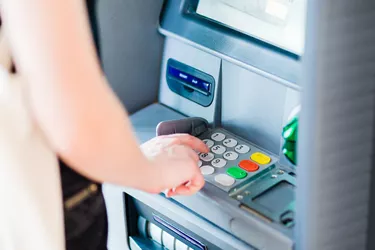
There are no limits to the amount of money you can deposit into your checking or savings account. Except for a few formalities, the process of depositing a large amount of money is similar to that of smaller amounts. These formalities help financial institutions comply with the Bank Secrecy Act, created to detect possible money laundering activities, and your money will be available to you in a few business days, depending on the amount. Here's what you should know about depositing a large check or depositing $5,000 cash.
Depositing a Large Check or Cash
Video of the Day
When depositing a large check or amount of cash, you'll complete a deposit slip at your bank, like you would for smaller amounts. Note the amount for cash and for checks, if any, and the overall amount in the appropriate boxes. Show the teller a legal form of picture identification, such as your driver's license or state ID card.
Video of the Day
By law, the teller must ask you some questions about the money when you're depositing a large check or amount of money. They usually ask about the source of it and record the information in a currency transaction report. This report is for the Internal Revenue Service, and it is necessary when a customer deposits or withdraws $10,000 or more. You will receive a receipt at the end of the transaction.
Understanding Suspicious Activity Report Filing
Your bank must file a Suspicious Activity Report, or SAR, when it notices behavior that may be illegal. For instance, it is illegal to try and prevent the bank from filing a CTR by depositing the money in small amounts over a period of time, whether at the same branch or different branches of the same bank. This is called structuring and could result in the IRS confiscating the money. Asking a teller not to file a CTR could cause the representative to file a SAR as well.
Considering Cash Deposit Fees
Some banks charge a cash deposit fee for transactions over an amount specified by internal bank policy and the type of account. This is due to the amount of time necessary to complete the transaction. The fee is more common for business customers, but some banks also charge individuals.
For example, Santander Bank charges business customers with the Basic Business Checking account either 22 cents or 27 cents for every $100 in deposits after $7,500, while these fees won't apply until after $40,000 in deposits for Business Checking Plus customers. Chase lets Business Total Savings customers deposit up to $5,000 per statement cycle without a fee.
Being Aware of Check Holds
The FDIC's Regulation CC addresses bank deposits. Banks must place a hold on check deposits of $5,000 and up. When you deposit an amount up to $5,000, the bank can place a hold on it for two business days, and any amount over $5,000 will be released after seven business days.
The hold is longer for accounts less than 30 days old. For those new accounts, the money will be available after nine days.